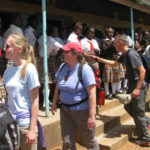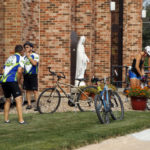Our nation will celebrate the 45th anniversary of Earth Day on April 22 at the same time many of us await an encyclical on human ecology by Pope Francis. Being in right relationship with creation is a teaching of the Catholic Church and one that calls us to examine how we put that teaching into action in our own lives.
Earth Day’s roots were planted in Rachel Carson’s seminal 1962 best-seller “Silent Spring” that exposed the deadly impact of DDT on people and the planet. Eight years later, Wisconsin Senator Gaylord Nelson, reacting to a massive oil spill in Santa Barbara, Calif., harnessed the energy of the student anti-war movement to raise consciousness about air and water pollution. Rallies were held nationwide that April 22, 1970. The U.S. Environmental Protection Agency was born of the early activists’ efforts, along with passage of the Clean Air, Clean Water and Endangered Species Acts (www.earthday.org).
We’ve become more conscious of the environment as it relates to our immediate needs and the patch of earth we inhabit. But we exhibit myopia regarding our consumption of natural and technological resources and the impact on our neighbors around the world. That’s the issue Pope Francis likely will address in his encyclical, based on early indications from prelates close to him.
In a March address to the 28th Session of the Human Rights Council in Geneva, Switzerland, Archbishop Silvano Tomasi stated that “the enjoyment of a sustainable environment is an issue of justice, respect and equity. Environmental degradation can and does adversely affect the ‘enjoyment of a broad range of human rights.’” The poor and vulnerable especially suffer from causes largely not of their making and beyond their control added the archbishop, who serves as permanent observer of the Holy See to the United Nations.
That same month, Cardinal Peter Turkson noted that Pope Francis from the beginning of his pontificate “put the protection of Creation to the very forefront of his own ministry and the vocation of every Christian.” The cardinal, speaking at a pontifical university in Ireland, said the pope sees “the ominous signs in nature … that our relationship with the Creation, with our neighbor, especially the poor, and with the environment has become fundamentally ‘un-kept,’ and that we are now at risk of a concomitant human, environmental and relational degradation” (Trócaire 2015 Lenten Lecture).
California’s drought-induced water crisis is a prime example. Groundwater has been sucked up out of the desert for uses that nature never intended. That impacts, among other things, farmers’ ability to grow produce the rest of us enjoy year-round. Others employed in the agriculture industry also suffer.
Climate change is considered by most experts to be a driving force in catastrophic weather events that have heaped misery on people around the world. Think of the 2013 typhoon that battered the Philippines. Twenty-five years before that crippling disaster, the Catholic Bishops’ Conference of the Philippines issued a letter with a call to action concerning the assault on creation in their country. They referred to it as the “ultimate pro-life issue.” The message speaks eloquently to all of us and remains relevant today.
“As Filipinos we can and must act now. Nobody else will do it for us. This is our home: we must care for it, watch over it, protect it and love it,” the bishops wrote. “We must be particularly careful to protect what remains of our forests, rivers, and corals and to heal, wherever we can, the damage which has already been done.”
They identified actions that are applicable worldwide. Individually, we should be aware of what’s happening in our area; use our influence within our families and communities to develop awareness; organize people around local ecological issues; become involved in a concrete action, like planting milkweed to help with the problem of a scarcity of butterflies. As a church, we should be sensitive to our unique living world, diverse culture and religious heritage. Liturgies should reflect on the beauty and pain of our world, our connectedness to the natural world and the ongoing struggle for social justice. We could also establish Care of the Earth ministries at the parish and diocesan level.
In a 2001 statement, our U.S. bishops, inspired by Pope John Paul II’s teachings, noted that changes in lifestyle based on traditional moral values can ease the way to a sustainable and equitable world economy. “For many of us, a life less focused on material gain may remind us that we are more than what we have.” Let’s reflect on that thought this Easter season.
Barb Arland-Fye











